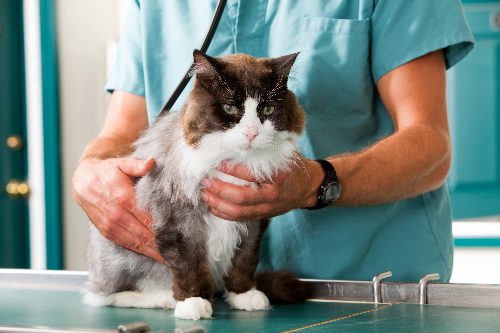If you’re a cat owner in Holmdel, NJ, understanding your cat’s health is crucial. Today, we’re focusing on a common concern: cat allergies. Identifying allergy symptoms early can lead to quicker, more effective treatment. Remember, while this guide is informative, it’s always best to consult your veterinarian for your cat’s health needs. Call us at (732) 671-3110 for expert advice or to make an appointment.

Understanding Cat Allergies: What Every Pet Owner Should Know
Cat allergies can be tricky to recognize. They often mimic other conditions, making it essential to know what to look out for. Allergies in cats happen when their immune system overreacts to a substance that’s usually harmless. These can range from environmental allergens like pollen to food ingredients. Understanding this can help you identify and manage your cat’s allergies effectively.
10 Signs Your Cat May Have Allergies
Here, we delve into the most common symptoms of cat allergies. Recognizing these signs is the first step in providing your cat with the care they need.
- Excessive Scratching or Licking: If your cat is constantly scratching or licking their skin, it might be a reaction to an allergen. This can lead to skin irritation or even infections.
- Sneezing or Coughing: Just like humans, cats can have respiratory responses to allergens. Sneezing or coughing may be a sign of an allergic reaction.
- Runny or Itchy Eyes: Allergens can cause eye irritation, leading to watery, red, or itchy eyes in your feline friend.
- Ear Infections: Frequent ear infections or head shaking could indicate an allergic reaction affecting your cat’s ears.
- Skin Rash or Hives: Look for any unusual rashes or hives on your cat’s skin. This could be a clear indication of an allergic reaction.
- Vomiting or Diarrhea: While often a sign of various conditions, persistent vomiting or diarrhea can sometimes be linked to food allergies.
- Snoring Caused by an Inflamed Throat: If your cat starts snoring or has difficulty breathing, it could be due to an inflamed throat caused by allergies.
- Paw Chewing or Swelling: Notice if your cat is excessively chewing their paws or if their paws appear swollen. This can be a reaction to allergens they’ve walked through.
- Changes in Behavior: Allergies can make your cat feel unwell, leading to changes in their normal behavior, such as lethargy or irritability.
- Bald Patches or Hair Loss: Persistent allergies can sometimes cause hair loss or bald patches due to excessive scratching or licking.
Next Steps: When to Contact Bayshore Veterinary Hospital
If you notice any of these symptoms in your cat, it’s important to take action. Don’t hesitate to call us at (732) 671-3110 to schedule an appointment. Our team at Bayshore Veterinary Hospital is equipped to diagnose and manage your cat’s allergies effectively. We’ll conduct a thorough examination and may recommend allergy testing. This helps us identify the specific allergens affecting your cat and create a tailored treatment plan.
Recognizing allergy symptoms in your cat is key to ensuring their well-being. At Bayshore Veterinary Hospital in Holmdel, NJ, we’re committed to providing top-notch care for your feline companions. Remember, early detection and professional guidance are vital. If you’re concerned about allergies in your cat, don’t wait. Call us at (732) 671-3110 for expert advice and to schedule an appointment. Together, we can ensure your cat lives a happy, healthy life free from the discomfort of allergies.
